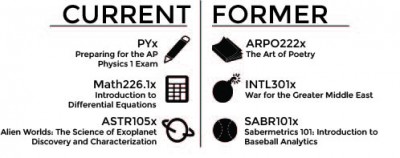Boston University released two Massive Open Online Courses in January, bringing the total of online MOOCs offered to six.

Hosted on the MOOC platform edX, Introduction to Differential Equations launched on Jan. 29 and an AP Physics test preparation course launched Jan. 5.
“The idea of MOOCs at BU is very much about showcasing some of the best teaching that is happening at BU. One of the goals is to demonstrate in the landscape of higher education the type of teaching that happens at BU,” said Romy Ruukel, the associate director of BU’s Digital Learning Initiative.
Paul Blanchard, a mathematics professor in the College of Arts and Sciences, said he received a grant from the DLI to teach his first MOOC, Introduction to Differential Equations.
“It’s a lot of work. It’s very interesting. The making of the videos is incredibly time consuming. This is a course I’ve taught many times,” he said. “I wasn’t familiar with the mode of instruction … Some of the problems I do by hand as I go. This is very similar to the way I teach in class. I add to the slides as I speak. I took the same format that I use in my BU course and brought that to the MOOC.”
Blanchard said the experience has differed from his typical class setup.
“I can’t look at faces, so I’m going on my experience from teaching this course for so many years. I can’t tell if people are confused or if they’ve lost track like I would be able to in a classroom,” he said. “It’s [also] very different because I’m used to standing up, using a blackboard, using my hands and walking around. I walk around a lot, and I can’t do any of that.”
The course will run in 16 modules in seven weeks with a midterm and a final, Blanchard said. It will end after spring break, which is shorter than a typical BU course.
Patrick Cummings, the coordinator for the course, said nearly 13,000 people have signed up for it, which can make teaching the course difficult.
“That’s the hardest thing I’ve had to do. There’s a wealth of problems in the textbook, but many of the answers require explanations,” he said. “Obviously, we can’t look through 13,000 responses, so all the answers have to be graded by computer. We use a lot of multiple choice or true [or] false.”
The typical demographic of students who enroll in MOOCs are in their late 20s and have a bachelor’s degree, Ruukel said.
Blanchard said MOOCs offer access to education that some students may have not previously had.
“First is access to education,” he said. “Suppose you were some student who was really good at math, and you lived somewhere the school system could not provide you with an adequate math education. MOOCs offer an opportunity to continue learning.”
Upcoming courses include Sabermetrics 101 and 201 — two levels of baseball analytics courses. Other proposals are in the process of being considered, Ruukel said.
Several students said they found the integration of technology and teaching important to giving people the opportunity to learn.
Marc Orlandella, a senior in the College of Arts and Sciences, said he is excited about the opportunities that MOOCs offer.
“The fact that they can bring education to anyone with an Internet connection is great,” he said. “It’s really cool that you can earn a certificate and put it on a resume.”
Jehangir Hafiz, a junior in SMG, expressed concerns that BU may be moving into the crowded field of online education.
“I hope they’re not competing in a saturated market,” he said. “I’d hope that professors are on the cutting edge of their field and bringing something innovative to the table.”






















































































































